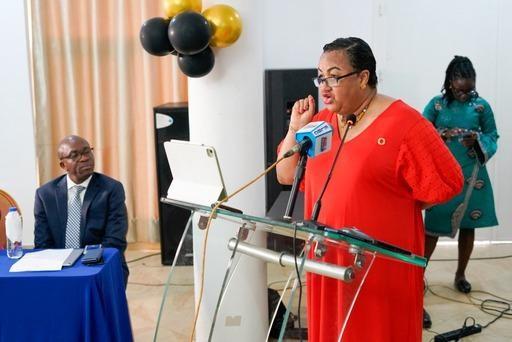Liberia: “We Will Boost Domestic Rice Production By 50% This Year”

Agriculture Minister, Jeanine M. Cooper
… Says, Agriculture Minister
Agriculture Minister Jeanine M. Cooper says that Liberia will boost domestic rice production by 50 percent this year.
Speaking at a one day forum in Monrovia yesterday, organized by the World Bank, the Minister said there are a lot of commitments from international partners to support farmers and agribusinesses to increase the production of the nation’s staple food.
Liberia produces 170,000 tons of rice annually for its growing population.
The forum was the launch of the 4th Edition of the World Bank Annual Liberia Economic Update, “Getting Rice Right for Productivity and Poverty Reduction”. The report outlines the challenges confronting rice and the ways in which the country needs to prioritize the production of rice to improve food security and reduce poverty in the lives of farmers.
The World Bank is one of Liberia’s major partners also to revitalize agriculture since the end of the Liberian civil crisis. Currently, it supports the Liberian government’s drive to improve the domestic production of rice and other value chains.
However, despite the World Bank and other partners’ support to agriculture over the years, Liberia is being rated as one of the food insecure nations of the world. The country still heavily relies on assistance from the donors to move its agriculture sector forward. The sector still faces numerous challenges.
However, Liberia’s agriculture minister has said that it is time to get rice right to improve domestic rice production.
“I once said it is time to get rice right. We intend to boost domestic production by 50 percent this year. In Liberia, if we haven’t eaten rice then it means we have not eaten anything yet. But our staple food still faces the issue of low production and rice quality remains poor. Our reliance on imported food is not sustainable. It is time to focus on how we can do it. It is about helping farmers and agribusinesses to move their produce faster and get them to the market,” the minister said.
Liberia entered a prolonged civil crisis as the result of increasing the price of rice. The country still spends over US$200 million annually for rice import, according to the country’s Finance Ministry. Every year the government has to subsidize the importation of rice with millions of dollars so that the commodity can become affordable for the many of the ordinary citizens.
Despite this, the minister said that Liberia has a very great potential to produce enough rice to reduce importation.
To accelerate domestic production of rice, she said that the Ministry of Agriculture has identified the commercial farmers with potential for rice within the country and plans are underway to provide additional support to the farmers and agribusinesses in the rice sector.
“We need to pour all of the resources from our partners in making rice right. We are going to identify more commercial production for farmers to produce more,” the Minister assured.
With resources being mobilized by the Liberian government from its partners, smallholder farmers in the rice sector and other value chains are obtaining grants under the Liberia Agriculture Commercialization Fund (LACF) to enhance productivity.
The LACF is a component of the World Bank and the International Fund for Agricultural Development (IFAD) projects at the Ministry of Agriculture. Over the last few years, several farmers in the various value chains have benefitted from the LACF process to enhance production.
The Minister said at the forum that the efforts of the LACF is expected to yield greater outcomes for the private sector and the country as a whole.
She outlined assistance to farmers as the improvement in the areas of irrigation structures for rice, the construction of warehouses and the upgrading of processing facilities, among others.
Meanwhile, Minister Cooper has clarified that Liberia’s main food insecurity problem is not rice but it is the issue of stunting.
She stated that indeed Liberia is producing other food crops like cassava that is consumed by the citizens in other parts of the country.
“We need to challenge the assumptions of our food insecurity. Though I agree that we do have some lapses, Liberians also depend on other food crops for their food consumption. Our food security challenge is stunting, something that we are working to address as a nation,” she mentioned.
